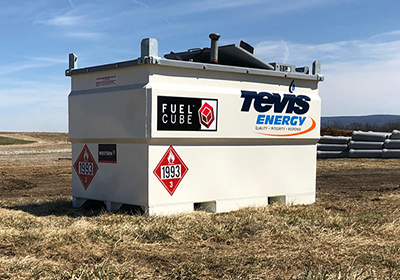Are Plastic or Metal Fuel Tanks Better?
Plastic and metal fuel tanks for sale each have their advantages and disadvantages. Metal fuel tanks are made of steel or aluminum and have a higher durability and are less susceptible to punctures. However, metal tanks can corrode over time especially salt and high moisture areas. These factors can lead to leaks and potential fuel contamination. Plastic fuel tanks are lighter and more efficient for use in tight spaces or in vehicles. Plastic fuel tanks for sale are less likely to rust or corrode, which improves their lifespan. Disadvantages for plastic fuel tanks are they can puncture easily and can speed up degrading time when holding extreme temperatures or certain chemicals. When looking for a fuel tank for sale you must consider what is going to be stored in it or the conditions it’s going to be kept in.
What is the Average Price of a Fuel Tank for Sale?
The average cost for a small fuel tank for sale ranges from $100 to $500 while larger more complex tanks range from $1,000 to $5,000 or more. Metal fuel tanks are typically made of steel or aluminum. These tanks tend to have a slightly higher cost due to the size and the materials and manufacturing process. There is the upfront cost of the tank, but there are maintenance requirements to prolong its life.
What is the Best Shape for a Fuel Tank?
There are many shapes and sizes that fuel tanks come in, rectangular, horizontal, and vertical. Rectangular are often used in vehicles where space is crucial such as trucks. The shape of these tanks allows them to be more compact to fit into tight spaces or to integrate with existing infrastructure. Vertical tanks take space where there is vertical empty space. If a fuel tank is needed and there is no room horizontally then a vertical tank is perfect for you!
How Big is a 500 Gallon Fuel Cube?
The Western Global 20TCG is a specific model of fuel storage tank manufactured by Western Global. This transportable tank is designed to hold 500 gallons (approximately 1,893.7 liters of fuel). The cube is 87 inches in length, 44 inches in width, and 52 inches in height. It is important to refer to the manufacturer of the tank due to optional features or specific configurations.
How Long Does a Fuel Tank Last?
The lifespan of fuel tanks vary based on what they are made of and what is stored in them. Metal fuel tanks are typically made of steel and aluminum and last an average of 10 to 20 years. However, if stored in corrosive environments it will shorten those life spans. Plastic fuel tanks tend to be more resistant to corrosion but can be easily punctured compared to metal tanks. However, these plastic tanks are more susceptible to temperature change and chemical exposure. With proper care and maintenance, you can expect a plastic fuel tank to range from 10 to 15 years. Composite fuel tanks are used by some modern vehicles and aircraft. These, being made of fiberglass or carbon fiber reinforced polymers, can last 20 years or more with proper maintenance.

Shop for Fuel Tanks for Sale on BuyFleetNow.com
What Is a Reputable Brand of Fuel Tanks for Sale?
Western Global is a well-regarded brand known for manufacturing high-quality fuel tanks and fluid handling equipment. They specialize in providing portable, durable, and efficient fuel storage solutions, catering primarily to industries such as construction, mining, transportation, and agriculture. Their products are designed with a focus on safety, compliance, and ease of use, making them a trusted choice for businesses that require reliable fuel storage and dispensing systems.
What’s the Difference Between a Jerry Can and a Fuel Tank?
Jerry Cans and fuel tanks are used for transporting fuel but have differences when it comes to design, capacity, and intended use. A Jerry can is a small portable container made of metal or plastic. The average can holds 5 gallons and features a rectangular shape. Fuel tanks are large containers that are stored on vehicles, equipment, or stationery. All tend to vary in size and can be made of different materials. Fuel tanks can range from a few gallons to thousands of gallons, depending on the application.
Video: How to Use a Fuel Cube
Recent Equipment News
MEC MME25 Review: Specs, Features & Industry Perspective
MEC MME25 Review: Specs, Features & Industry [...]
Construction Equipment Trends 2025: Inside Q1–Q2 Demand & What It Means for You
Table of Contents Top 10 Categories Q1 vs [...]
FleetNow Announces Elijah Dollarhide as 2025 Construct Your Future Scholarship Winner
FleetNow Announces Elijah Dollarhide as Construct Your Future Scholarship [...]












































